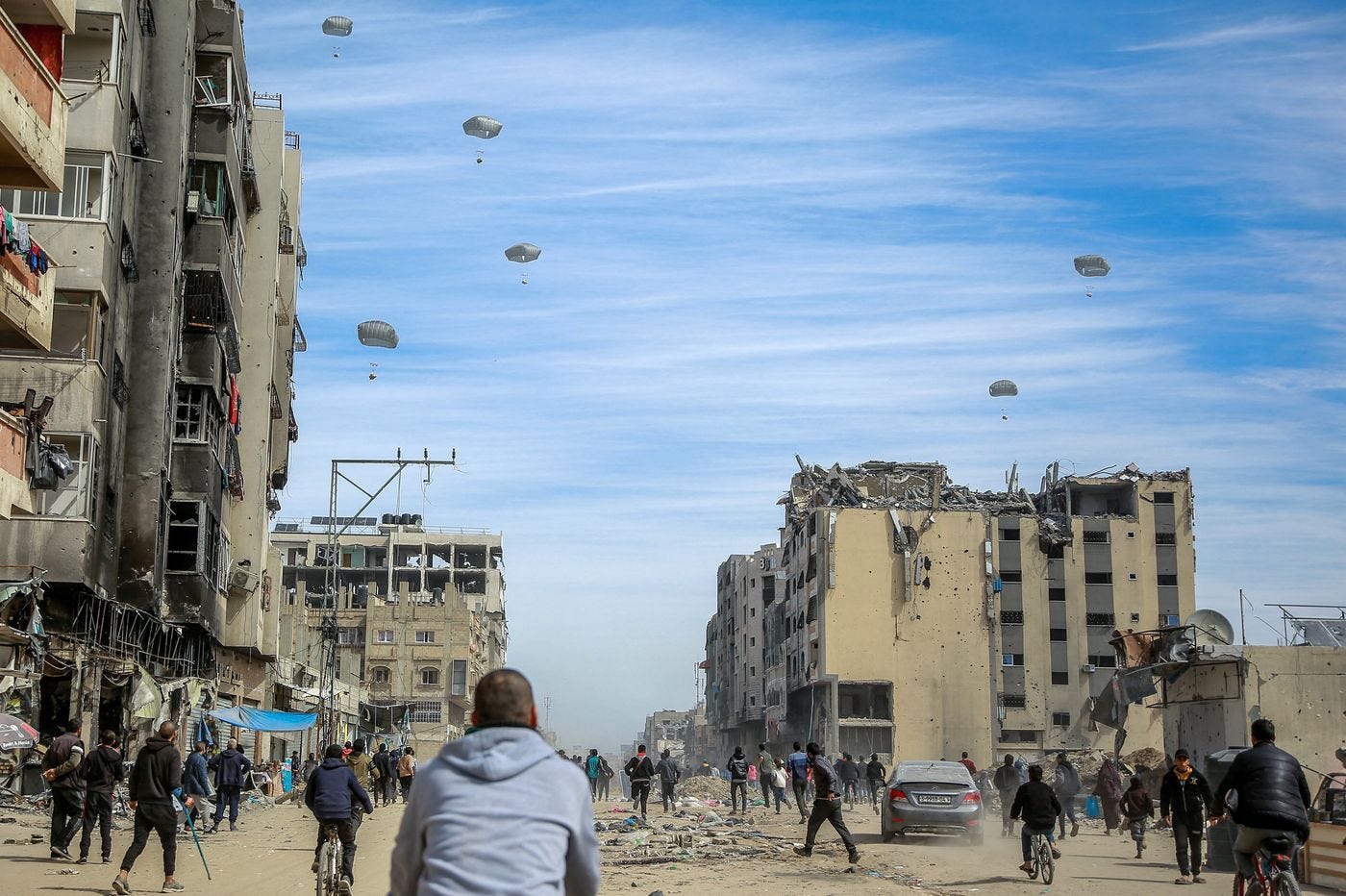‘Flood the zone’: U.S. looks to pour aid into Gaza to ease desperation, lawlessness
U.S. officials urge massively scaling up aid into Gaza to ease desperation and growing lawlessness. But for the scale needed, “it’s essential that we see a ceasefire.”

Senior American officials, speaking after U.S. Central Command for the first time airdropped food into Gaza today, said they were looking to flood Gaza with aid to curb growing lawlessness and looting by criminal gangs and reduce the desperation of the starving population.
But the plan to massively increase the amount of aid distributed across Gaza is logistically dependent on being able to reach a temporary ceasefire deal.
“To really address the urgent needs…at the scale that is needed, it’s essential that we see a ceasefire in Gaza,” a senior U.S. administration official, speaking not for attribution on a virtual call with reporters today, said.
U.S. officials were still intently focused on reaching a six week hostage release/ceasefire deal between Israel and Hamas in the coming days, that would, if reached, free the most vulnerable Israeli hostages and enable a vast amount of humanitarian aid to enter Gaza and be distributed. Israel has basically agreed to the deal, a senior U.S. official said, and the onus now was on Hamas to agree to it.
“The path to a ceasefire right now, literally at this hour, is straightforward,” the official said. “There's a deal on the table. The Israelis have more or less accepted it. …The onus right now is on Hamas.”
The problem in Gaza is not so much the ability to get aid trucks into Gaza, but distribution inside Gaza, amid growing lawlessness, a second senior U.S. official said.
“The problem has been distribution,” the second official said. “And distribution is what matters.”
“If you cannot move assistance from storage facilities, from warehouses… you’re not meeting the critical needs, to provide that minimal feeding that prevents famine,” the second official said.
The second official described growing lawlessness in Gaza and criminal gangs looting the aid to resell it to the starving population.
“There's a way that you resolve this problem. And the way is you flood the market,” he said. “You bring in assistance from every point you can—air, sea, land. You bring it in, and you know that some of this assistance is going to be looted. …But you keep it coming.”
“And with that, you de-incentivize the criminal groups…involved in attacking trucks, and you reduce the pressure on desperate people…who just want food, because the food is there,” the official said. “It's coming in. Now, the President's intent is to see that flooding of zone.”
The first official said talks to try to reach the temporary pause/hostage release deal are currently underway in Doha, Qatar. They are intensively trying to get the deal clinched by the start of the Muslim holy month of Ramadan, which starts March 10.
“There has been significant progress over the last few weeks,” the first official said. “But…until a deal is actually done, it’s not done. But that's where we are.”
Israel’s Channel 12 reported today, citing an unnamed senior Israeli official, that Israel was threatening not to send a delegation to hostage release/temporary ceasefire talks expected to be held in Cairo on Monday if they do not receive specific information requested, including on the number of hostages still alive, and how many in the vulnerable category would be included in the release.
Benny Gantz, a member of the Israeli war cabinet and former Israeli Defense Minister, will arrive in Washington on Sunday, and meet with U.S. Vice President Kamala Harris on Monday, Bloomberg News reported, citing a White House official. The visit is politically sensitive, given Gantz is an opposition politician seen as a potential rival to Prime Minister Netanyahu. Israeli media reported that Netanyahu’s office has raised objections to the trip.
Gantz requested the visit, a source indicated. In addition to Vice President Harris, Gantz is also expected to meet with National Security Advisor Jake Sullivan and team.
Meantime, a key mediator in the hostage release/ceasefire talks, Qatar Prime Minister Al Thani, is flying to Washington D.C. on Monday.
U.S. Central command said that it had conducted a humanitarian assistance airdrop into Gaza today, together with the Jordanian Air Force. Three “U.S. C-130s dropped over 38,000 meals along the coastline of Gaza,” Centcom said.
U.S. officials acknowledged the airdrops were not adequate to the scale of the need in Gaza.
“This will be part of a sustained effort, conducted with our international partners, to scale up the amount of life-saving aid we're getting into Gaza,” a senior administration official said on the call. “We’re looking at the land routes, we're looking at the sea route, we're looking at the air route, to really ensure that we're exploring every opportunity to get assistance in.”
**
**


